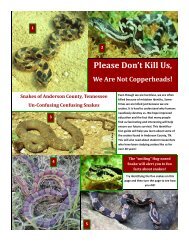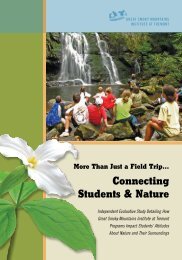Course Descriptions - Great Smoky Mountains Institute at Tremont
Course Descriptions - Great Smoky Mountains Institute at Tremont
Course Descriptions - Great Smoky Mountains Institute at Tremont
Create successful ePaper yourself
Turn your PDF publications into a flip-book with our unique Google optimized e-Paper software.
<strong>Course</strong> <strong>Descriptions</strong><br />
Southern Appalachian N<strong>at</strong>uralist<br />
Certific<strong>at</strong>ion Program<br />
N<strong>at</strong>uralist Skills<br />
N<strong>at</strong>uralist Skills provides an historical survey of the study of n<strong>at</strong>ural history and its<br />
practice as conducted by a n<strong>at</strong>uralist. Students will learn the n<strong>at</strong>uralist traditions,<br />
observ<strong>at</strong>ion techniques, journal keeping, and the tools of a n<strong>at</strong>uralist. Due to the shorter<br />
n<strong>at</strong>ure of the N<strong>at</strong>uralist Skills course, it will be offered the same weekend as Interpret<strong>at</strong>ion: A<br />
Teacheable Art, allowing participants to<br />
complete two courses in one weekend.<br />
Southern Appalachian Ecology<br />
Learn about the ecology of the<br />
Southern Appalachian <strong>Mountains</strong>,<br />
particularly as it rel<strong>at</strong>es to <strong>Gre<strong>at</strong></strong><br />
<strong>Smoky</strong> <strong>Mountains</strong> N<strong>at</strong>ional Park,<br />
through discussions and field trips.<br />
Topics will include geological history,<br />
plant community distribution, how<br />
aspect, elev<strong>at</strong>ion, and moisture<br />
gradients affect distribution, and an<br />
overview of plant communities with a<br />
focus on the major forest types. Field<br />
trips will include visits to examples of<br />
many of these forest types. Visit our web site to learn about the pre-homework activities<br />
and reading necessary for this course.<br />
Birds of the Smokies<br />
Wh<strong>at</strong> could be better than a weekend of bird w<strong>at</strong>ching! Discover the many bird species<br />
of the Southern Appalachian <strong>Mountains</strong> while we focus on their specific adapt<strong>at</strong>ions<br />
and distributions in <strong>Gre<strong>at</strong></strong> <strong>Smoky</strong> <strong>Mountains</strong> N<strong>at</strong>ional Park. Emphasis will be given to<br />
general n<strong>at</strong>ural history of each species, including but not limited to: distribution,<br />
associ<strong>at</strong>ions, reproduction, vocaliz<strong>at</strong>ions, st<strong>at</strong>us, conserv<strong>at</strong>ion, research methods, etc.<br />
Field trips will take us to a variety of habit<strong>at</strong>s, from low elev<strong>at</strong>ions to high, in search of<br />
the<br />
Interpret<strong>at</strong>ion: A Teachable Art<br />
Interpret<strong>at</strong>ion: A Teachable Art provides rudimentary knowledge regarding the theory<br />
and principles of environmental interpret<strong>at</strong>ion, how to communic<strong>at</strong>e effectively, and<br />
how to develop meaningful interpretive programs. Expect fun, hands-on activities and
particip<strong>at</strong>ory educ<strong>at</strong>ion as we progress from learning about good communic<strong>at</strong>ion to<br />
actually teaching. Visit our web site to learn about the pre-homework activities and<br />
reading necessary for this course.<br />
Plants<br />
Delve into the incredible diversity of plants found in<br />
the southern Appalachians! We’ll make it easy to<br />
learn botanical terms, plant taxonomy, and plant<br />
identific<strong>at</strong>ion. Students will particip<strong>at</strong>e in several<br />
field classes during which they will investig<strong>at</strong>e<br />
particular plant communities, learning the plants<br />
common to those communities. Emphasis is given to<br />
plant distribution and communities and practice with<br />
keys and field guides. You never knew botany could<br />
be so fun!<br />
Reptiles and Amphibians<br />
Discover the secret lives of reptile and amphibian<br />
species in the Southern Appalachian <strong>Mountains</strong>. We<br />
will focus on their specific adapt<strong>at</strong>ions and<br />
distributions in <strong>Gre<strong>at</strong></strong> <strong>Smoky</strong> <strong>Mountains</strong> N<strong>at</strong>ional<br />
Park. Emphasis will be given to general n<strong>at</strong>ural<br />
history of each species, including but not limited to; distribution, associ<strong>at</strong>ions,<br />
reproduction, st<strong>at</strong>us, conserv<strong>at</strong>ion, research methods, etc. Fieldwork will include<br />
surveys of popul<strong>at</strong>ions of reptiles and amphibians using traditions methods such as<br />
cover boards, leaf litter bags, etc.<br />
Aqu<strong>at</strong>ic N<strong>at</strong>ural History<br />
This course provides an overview of the unique ecology of aqu<strong>at</strong>ic systems in the<br />
Southern Appalachian <strong>Mountains</strong>, particularly as it rel<strong>at</strong>es to <strong>Gre<strong>at</strong></strong> <strong>Smoky</strong> <strong>Mountains</strong><br />
N<strong>at</strong>ional Park, through discussions and field trips. Topics will include aqu<strong>at</strong>ic<br />
macroinvertebr<strong>at</strong>es, habit<strong>at</strong>s, conserv<strong>at</strong>ion issues, etc. Field trips will include visits to<br />
examples of many of these aqu<strong>at</strong>ic systems.<br />
Mammals<br />
Explore the diversity of mammal species<br />
in the Southern Appalachian <strong>Mountains</strong><br />
with a focus on the management<br />
practices used within <strong>Gre<strong>at</strong></strong> <strong>Smoky</strong><br />
<strong>Mountains</strong> N<strong>at</strong>ional Park. Emphasis will<br />
be given to general n<strong>at</strong>ural history of<br />
each species, including but not limited<br />
to: distribution, associ<strong>at</strong>ions,<br />
reproduction, st<strong>at</strong>us, conserv<strong>at</strong>ion,<br />
research methods, etc. Adjunct faculty<br />
will include resource management<br />
professionals from <strong>Gre<strong>at</strong></strong> <strong>Smoky</strong><br />
<strong>Mountains</strong> N<strong>at</strong>ional Park and the<br />
University of Tennessee.


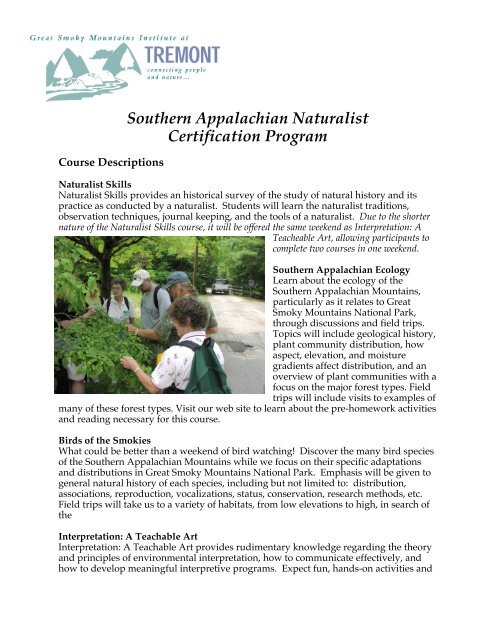


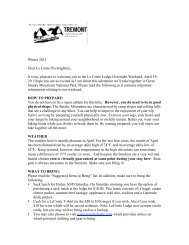
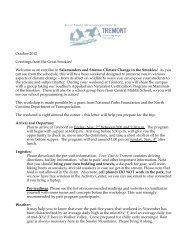
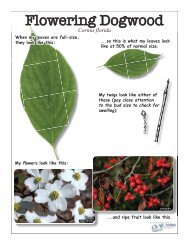
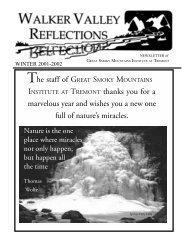
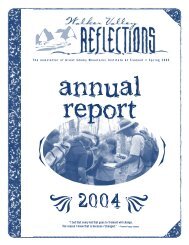
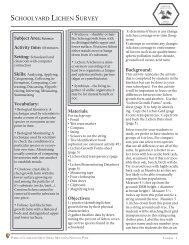
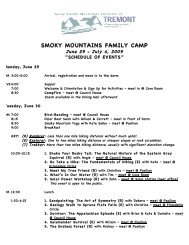
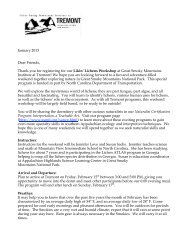
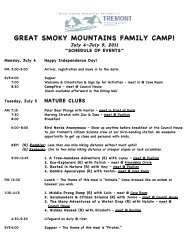
![Application [PDF] - Great Smoky Mountains Institute at Tremont](https://img.yumpu.com/22110613/1/190x245/application-pdf-great-smoky-mountains-institute-at-tremont.jpg?quality=85)
